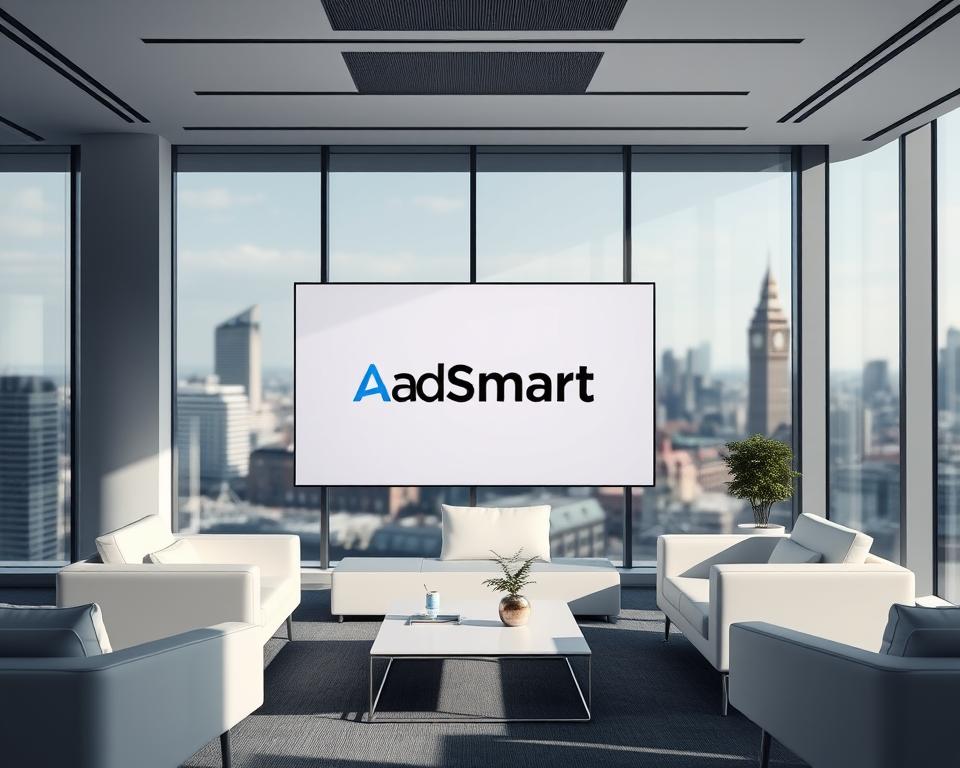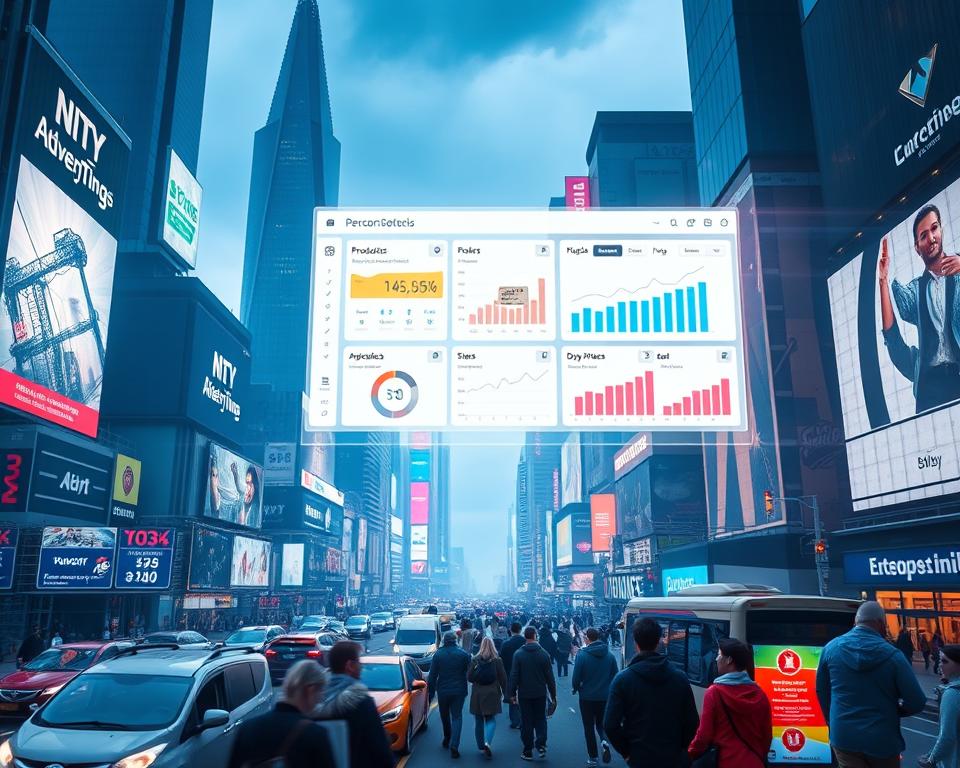
How AdSmart is Changing Video Advertising in the UK
Did you know traditional TV ads have been on British screens for over 80 years? The first commercial aired in 1955. Now, AdSmart is changing this. With Sky’s 23 million UK customers and £16 billion in revenue, it’s rewriting video ad rules.
AdSmart uses Sky’s data and insights from Experian and Mastercard. This means ads reach the right people at the right time.
Imagine targeting mid-sized construction firms near you who’ve looked for marketing services. This was once impossible with traditional TV ads. AdSmart’s tech now shows ads on 127 TV channels and 50 devices.
It combines the wide reach of TV with digital’s precision. With 4 million Sky households, brands can track viewer behaviour with great accuracy.
What’s revolutionary about this shift? AdSmart cuts down on wasted ad spend by focusing on verified households. Even small businesses can now run effective campaigns without huge budgets. Sky’s Interactive Voice Ads let viewers interact with ads using voice commands, blending TV with digital.
Key Takeaways
- AdSmart partners with Experian and Mastercard to enhance targeting for video advertising in the UK.
- Household-level targeting ensures ads reach specific demographics, such as local business owners in defined geographic zones.
- Cost efficiency improves as campaigns avoid traditional TV’s blanket approach, reducing wasted spend.
- Interactive Voice Ads allow viewers to engage via voice commands, merging TV with digital advertising features.
- A 4 million-household panel provides 750 times more data than BARB, ensuring precise ad delivery.
The Evolution of Video Advertising in the UK
Video marketing has changed a lot from the 1950s. It moved from traditional TV to digital platforms. Now, online video ads make up nearly 23% of digital ad spend in the UK, hitting £5.5 billion in 2021. But, this journey has faced many challenges.
From Traditional TV to Digital Platforms

Early online video ads in the 2000s were simple but often low-quality. YouTube’s 2007 InVideo ads and 2008 TrueView options were big steps forward. Later, Teads and Unruly introduced outstream ads in 2014, and SeenThis’s 2017 adaptive streaming tech sped up loading times. These developments laid the groundwork for today’s digital video marketing.
| Year | Key Development |
|---|---|
| 2007 | YouTube launches InVideo ads |
| 2008 | YouTube introduces TrueView skippable ads |
| 2014 | Outstream ads gain traction via Teads/Unruly |
| 2017 | SeenThis launches adaptive streaming tech |
The Challenges of Conventional Video Marketing
Traditional TV ads had big problems. They were expensive, hard to target, and hard to measure. Brands found it tough to see how well their ads worked.
Online video ads brought new issues. Ad blockers, short attention spans, and many platforms made things harder.
The Need for Innovation in the Advertising Landscape
Today, people want ads that feel personal. They skip ads that don’t grab their attention. New ideas like AI, interactive videos, and AR/VR are key. TikTok and Instagram show that short, creative online video ads work well with younger viewers.
There’s also a growing need for ads that show a brand cares about the planet. Brands must now match their ads with ethical values to win over today’s consumers. This shows that innovation is not just good, but essential.
What is AdSmart and How Did It Emerge?
AdSmart changed the game in video advertising in the uk. It was born from Sky’s need to update old TV ad ways. Launched in August 2013 by BSkyB, it brought targeted ads to linear TV. It sent ads to Sky+HD boxes based on age, location, and lifestyle.

Before AdSmart, digital advertising couldn’t match TV’s reach. But Sky’s tech made set-top boxes act like mini ad servers. By 2013, Sky wanted to work with 30-40 advertisers, showing its big plans. The system grew to cover more TV types, using data to make ads better.
In 2015, it won the first Grand Prix at the Adwanted Media Research Awards. By 2020, AdSmart teamed up with Virgin Media to grow in the UK. With Comcast’s $42 billion buy in 2018, it got better at targeting. Now, it has 48% less ad skipping and 13% more viewer interest than old ads.
How AdSmart’s Technology Works
AdSmart’s tech changes how online video ads find their way to viewers. It uses smart data and precise delivery systems. The platform combines Sky’s data with insights from 14+ partners for targeted campaigns.

Audience Segmentation and Targeting Capabilities
AdSmart looks at over 1,200 audience traits, like age and shopping habits. For instance:
- Target homes near a store with geo-fencing
- Show baby ads to families with new babies
- Reach people at life events, like buying a home
Data Integration and Analysis Systems
Data from Experian, Mastercard, and Captify powers AdSmart’s algorithms. It builds detailed profiles using:
- Socio-demographic data (income, job)
- Behavioural patterns (TV watching, online searches)
- Transactional insights (buying histories)
Delivery Mechanisms for Personalised Advertisements
Ads are loaded overnight via satellite to Sky boxes. They’re ready for live broadcasts. During viewing, the system swaps ads for tailored content in real-time. Ads only show when devices are on, ensuring viewers are engaged.
Each ad placement is optimised with 1 billion+ targeting options. It blends TV and digital strategies for better reach. This approach redefines how brands connect with audiences without interrupting their viewing.
The Revolutionary Impact on Targeted Advertising
AdSmart is changing digital advertising by mixing TV’s wide reach with online precision. It uses Sky’s data to help brands target better. This is key as over-50s now spend 100 minutes daily on video marketing sites like TikTok and YouTube.

Household-Level Targeting
Old TV ads often didn’t hit their mark. But AdSmart makes sure ads reach the right households on any device. For example, a local bakery can target homes within 5 miles who like food content.
Geographic and Demographic Precision
AdSmart targets by postcode and demographic, like age and income. A retirement home might target Kent homes with 55+ viewers. A car brand could aim for London’s high-income areas. This method cuts waste and boosts returns.
| Old Methods | AdSmart Solutions |
|---|---|
| Broad regional ads | Postcode-level accuracy |
| Demographic guesses | Real-time household data |
| Static messaging | Dynamic content adjustments |
Behavioural Profiling Advantages
Brands now look at what people watch and buy to guess what they want. A gym might target those who watch fitness videos and search for wellness. This makes 43% more people take action when ads feel made for them.
Benefits for Small and Medium Businesses
Small businesses in the UK don’t have to think video advertising in the uk is only for big brands anymore. AdSmart’s platform makes it easier to start, with prices starting at £3,000. This avoids the high costs of blanket TV ads.
Local businesses like restaurants, car dealers, and schools can target specific areas or groups. This means they spend less and reach the right people.
Over 4,000 advertisers on Sky use AdSmart, including many first-time TV advertisers. It makes traditional TV useful for smaller markets. A 70% retention rate shows its worth: 92% of marketers already focus on video. Now, small businesses can use this power too.

- Targeted ads reduce costs while boosting reach to 85% of monthly online video viewers.
- Trackable campaigns with real-time data let businesses adjust strategies mid-campaign.
- Seasonal campaigns align with local events, ensuring ads appear when relevance peaks.
Even small budgets can make a big impact. A £3,000 campaign with video production services tailored for local needs can increase website visits by 90%. For example, a gym in Manchester targeting new mothers saw a 35% increase in sales after six weeks.
AdSmart lets small businesses compete with big brands. They can use TV’s trusted format to build local loyalty. With 73% of B2B marketers boosting ROI through video, it’s time to join them.
How Major Brands Are Utilising AdSmart Solutions
Leading UK brands are using AdSmart’s video campaign management tools to change their digital advertising plans. They include big names and new startups. These companies show how custom campaigns can make a big difference without being too hard to manage.
Case Studies of Successful Campaigns
Brands like FFS, Open Space Concepts, and Laures Homes have seen great results:
- FFS boosted sales by 22% after targeting Love Island viewers with razor-focused ads during the show’s peak season.
- Open Space Concepts saw a 35% rise in inquiries by using location-based targeting for their outdoor living spaces, focusing on 50+ age groups in regions like the Home Counties and Manchester.
- Laures Homes increased property viewings by 40% by aligning ads with TV shows popular among first-time buyers.

Return on Investment Metrics
| Metric | Detail | Result |
|---|---|---|
| Impression Tracking | Only counts ads viewed for 75%+ duration | £200 saved per campaign on average |
| Word-of-Mouth Lift | 14% higher than non-AdSmart campaigns | Organic social mentions up by 28% |
| Targeted Reach | Access to 9.3 million UK homes | 90% of advertisers report better ROI than traditional TV |
Brand Perception Improvements
AdSmart’s precision has changed how people see brands. For example, 57% of new advertisers now use AdSmart. This mix of TV’s trust and digital’s speed has helped Laures Homes see a 15% increase in customer trust scores. FFS also saw a 25% drop in ad complaints, showing that being relevant matters.
These outcomes show how AdSmart connects traditional TV’s wide reach with modern digital advertising flexibility. This makes campaigns both effective and affordable.
Integration with Broader Video Content Creation Strategies
Creating effective video content is more than just airing ads. AdSmart’s insights help brands improve their video production services. Start by making sure your TV ads and digital videos have the same message. This means consistent branding, tone, and calls to action.

- Repurpose content wisely: Turn TV ad clips into social media teasers or YouTube shorts to extend reach.
- Optimize for platforms: Use AdSmart’s geo-targeting data to tailor video lengths and styles for platforms like Instagram vs. YouTube.
- Leverage analytics: Track performance metrics via YouTube’s insights tools to refine future video production services.
Agencies like Fettle and Venture Videos demonstrate how this works. They create campaigns where AdSmart’s targeting data guides scriptwriting and visual styles. For instance, a beauty brand might use geo-specific clips produced by Passion to highlight local stores, while keeping the brand consistent.
“The best campaigns start by letting data guide creative decisions,” says a director at Squideo. “AdSmart’s viewer insights ensure every video production service aligns with what audiences actually want to see.”
Using AdSmart with YouTube’s skippable ads lets brands test messaging quickly. If a 15-second clip doesn’t work, change the script based on AdSmart’s data. This feedback loop keeps video content sharp and focused on ROI.
Integrating AdSmart’s analytics with broader marketing goals, like boosting web traffic or store visits, helps measure success.
AdSmart vs Traditional Video Advertising in the UK: A Comparison
Choosing between video advertising in the uk is a big decision for advertising agencies. They must decide between traditional methods and AdSmart’s new approach. This section highlights the main differences that shape today’s campaigns.

| Aspect | AdSmart | Traditional Video Advertising |
|---|---|---|
| Cost Efficiency | Pays only when ads are viewed for 23+ seconds of 30-second spots | Pays upfront, no guarantee of audience engagement |
| Reach & Engagement | Targets 10M households via 1,200+ demographic/geo options | Broader reach but less relevance, with 20% decline in linear TV ad spend |
| Analytics | Real-time data tracking sales uplift and web traffic | Limited insights, relying on outdated ratings systems |
Cost Efficiency Analysis
AdSmart’s pay-per-view model saves money. Traditional video advertising in the uk charges upfront, risking wasted budgets. AdSmart only charges when ads are fully engaged with.
Traditional TV’s revenue drop from £5.1bn to £4.9bn shows inefficiencies.
Reach and Engagement Differences
- AdSmart’s 1200 targeting options ensure ads reach 10M UK households with precision
- Traditional TV’s 27% household penetration lacks focus, leading to lower engagement
Measurement and Analytics Capabilities
AdSmart gives advertising agencies real-time KPI tracking. It tracks website visits and sales lifts. Traditional methods struggle to link ads to outcomes, relying on outdated metrics like GRP (Gross Rating Points).
Working with Advertising Agencies to Leverage AdSmart
Partnering with advertising agencies is key to unlocking AdSmart’s full power. These experts connect your brand goals with the technical side of addressable TV ads. When picking an agency, look for those with a track record in video production services for targeted TV ads.
- Choose agencies good at data-driven targeting to match ads with Sky’s filters.
- Go for partners who mix creative stories with AdSmart’s precision.
- Make sure they support you fully, from script to post-production for video production services that grab niche audiences.

Agencies focused on TV ads can help brands use Sky’s AdSmart analytics. They use viewer data to improve ad placement, cutting channel-switching by 48%, as AdSmart’s research shows. Their skill ensures ads connect emotionally, boosting viewer engagement by 13% over traditional ads. When briefing agencies, share your audience insights and goals to boost ROI.
Work closely with agencies to blend AdSmart into your marketing plans. They can guide on budgeting for linear TV and VOD, making sure campaigns fit Sky’s growing addressable platforms. By combining their tech skills with your brand’s vision, agencies craft stories from data that engage UK homes.
Future Trends in AdSmart and Video Campaign Management
AdSmart is changing the game for video ads. New tech and what people want are making video ads more lively and precise.
Artificial Intelligence and Machine Learning Applications
AdSmart’s AI tools are changing how we manage ads. They use real-time data to tweak ads on the fly, making them more effective. Machine learning helps pick the best ads, and voice-activated ads are being tested.
By 2025, AI could change ad parts like backgrounds or music instantly. This could save money and make ads more personal.
Cross-Platform Integration Possibilities
AdSmart goes beyond TV to offer smooth experiences on all devices. Key improvements include:
- Programmatic ad buying for premium on-demand content via Sky’s platform
- Unified targeting across 100+ TV channels, streaming, and mobile
- Interactive shoppable ads letting viewers purchase products mid-broadcast
Short ads under 30 seconds are becoming popular for social media and live TV. Sky’s Media IQ helps TV and digital ads work together, making ads more relevant.
Privacy Considerations and Regulatory Developments
New privacy laws mean we need new ways to handle data. AdSmart uses first-party data from set-top box interactions to follow GDPR. They target households without using third-party cookies, keeping ads precise while respecting privacy.
Challenges and Limitations of the AdSmart Platform
AdSmart offers new ways to target TV ads, but it comes with its own set of challenges. For video marketing teams, dealing with broadcaster rules and different platforms is tough.
Creative teams at BBC and Sky are facing the hard part of making ads fit broadcast standards, showing the platform’s growing pains.
- Reach limitations: Only 140 channels block gambling ads, leaving many homes without them.
- Cost barriers: High fees for premium spots and custom ad making can be hard for advertising agencies with tight budgets.
- Data hurdles: EU laws might limit access to data by 2024, affecting ad targeting.
- Creative constraints: Ads must meet strict broadcast rules, needing better quality than online ads.
Measuring ad success across platforms is tricky. The 2020 gambling ad rules, like one ad per break, force a rethink in strategy. With 95% of live football breaks having gambling ads before AdSmart, following these rules is now key.
Small businesses might find it hard to afford video marketing with costs over £50k for targeting. Advertising agencies need to adjust to meet broadcast deadlines and tech specs. Even though AdSmart launched on Sky Q and Virgin Media in 2019, it’s years before it reaches everyone.
Despite the challenges, smart agencies are finding ways to mix AdSmart’s precision with wider campaigns. This approach balances new ideas with what works. The Gambling Commission’s 2023 report shows a rise in problem gambling to 430,000 cases, making it vital to follow new ad rules for ethical video marketing.
Conclusion: The Future of Video Advertising in a Post-AdSmart World
Video advertising in the UK is on the brink of a big change, thanks to AdSmart’s addressable TV solutions. Now, ads can target specific audiences much better, leading to higher returns. With more UK homes using connected TVs, marketers need to keep up.
Traditional TV is not going away, but it’s changing. Big brands are using it for national campaigns. But, for the most part, ads now need to be based on data to work well.
Future video ads will use cool tech like augmented reality and interactive features. ITV and The Trade Desk are already working together, showing how TV and digital ads are coming together. AdSmart’s tools help advertisers make changes every day.
By 2025, almost 44 million UK homes will have connected TVs. This makes targeted ads key for growth. Businesses should focus on understanding their audience and being quick to adapt.
The rise of CTV and the £515 million addressable TV market show a clear path forward. As we get better at measuring ads, we can make them more effective. Whether it’s through AdSmart or new tech, the future of video ads is bright. It will reward those who innovate and keep telling great stories.